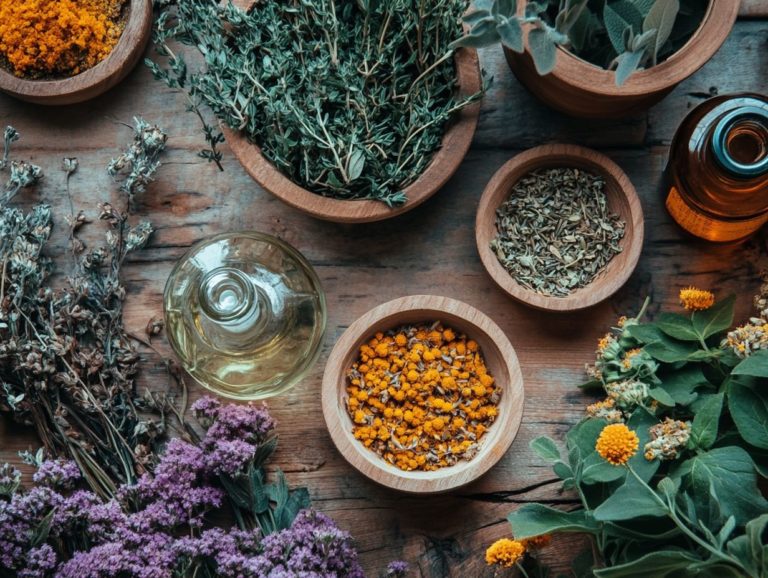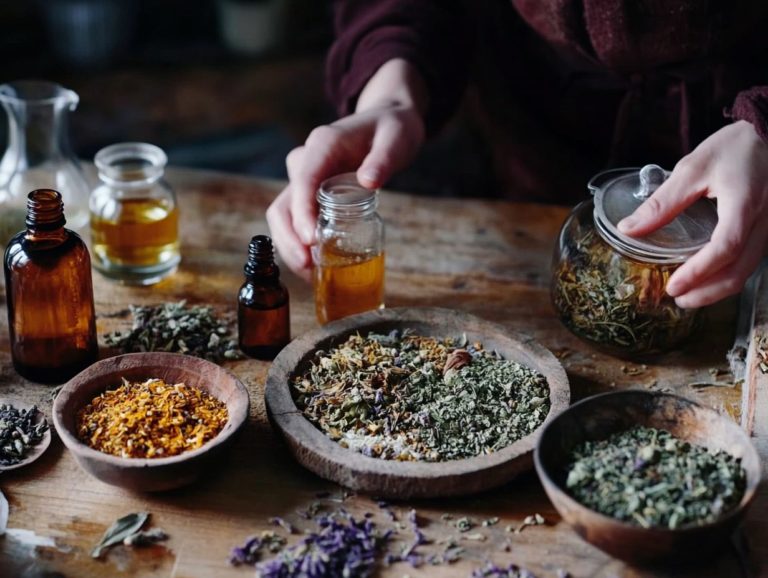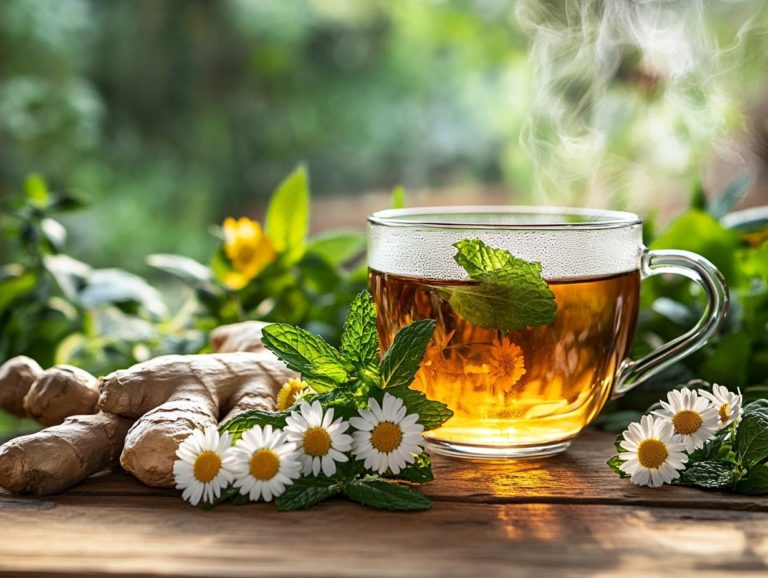What Is the Role of Herbal Remedies in Holistic Health?
In a world that prioritizes wellness, the concept of holistic health offers a comprehensive approach to well-being. It integrates physical, mental, and emotional dimensions of life, including insights from traditional and complementary medicine.
This article explores the role of herbal remedies within this holistic framework, tracing their historical roots in traditional medicine. We will illuminate their distinctive benefits.
From familiar herbs to essential safety considerations, get ready to discover valuable insights that can transform your health! Learn how to seamlessly incorporate these natural solutions, such as herbal preparations and dietary supplements, into your holistic lifestyle.
Discover how blending nature with health can elevate your overall well-being.
Contents
- Key Takeaways:
- The Concept of Holistic Health
- Herbal Remedies in Traditional Medicine
- Benefits of Using Herbal Remedies
- Common Herbal Remedies and Their Uses
- Are Herbal Remedies Safe and Effective? Find Out!
- Integrating Herbal Remedies into Holistic Health Practices
- Frequently Asked Questions
- Curious about herbal remedies? Let s dive into their role in holistic health!
- What types of herbal remedies are commonly used in holistic health?
- How do herbal remedies promote holistic health?
- Are there any risks associated with using herbal remedies in holistic health?
- Can herbal remedies be used with traditional medicine?
- Discover some exciting herbal remedies used in holistic health!
Key Takeaways:
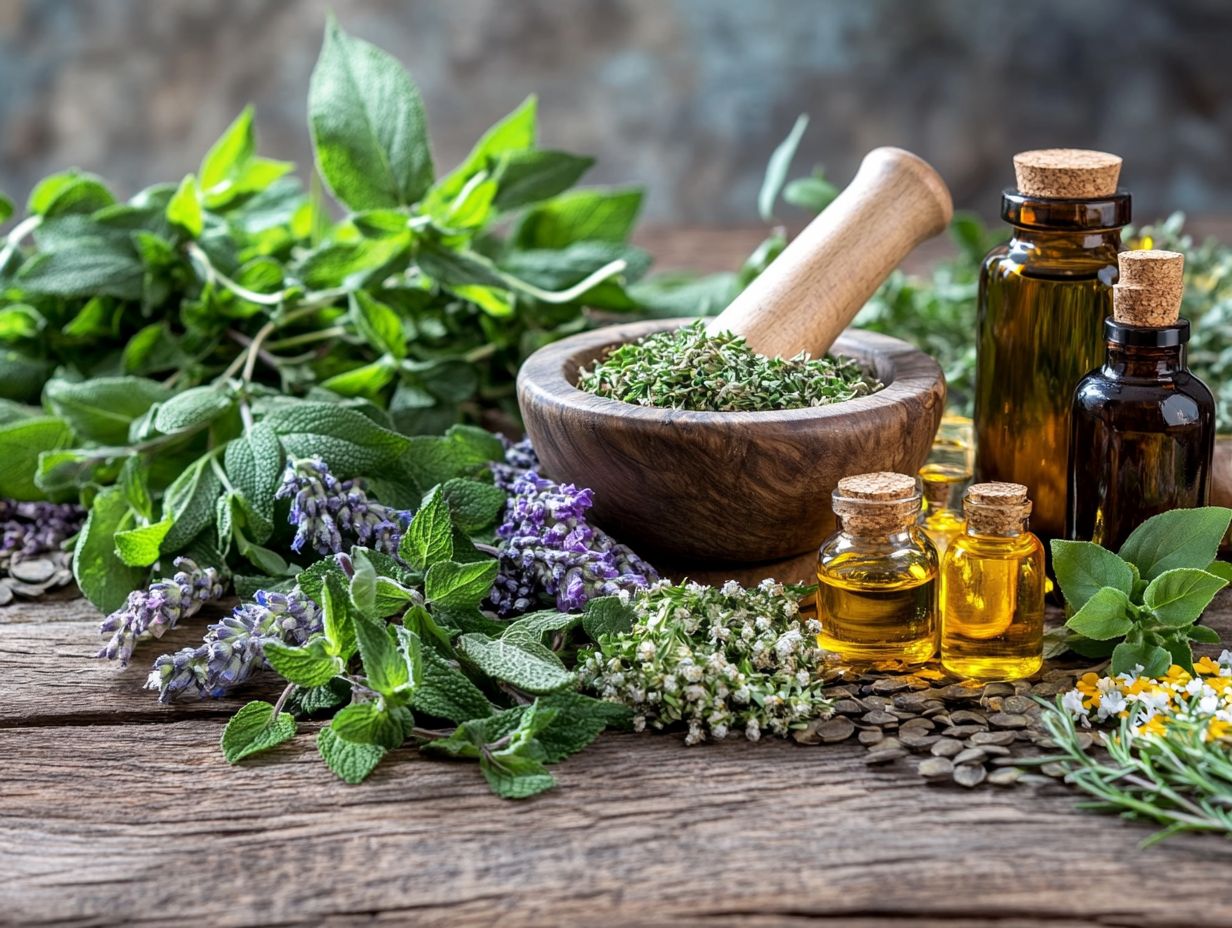
- Herbal remedies have been used for centuries in traditional medicine and have been found to have various physical and mental health benefits, often supported by clinical trials.
- Safety and effectiveness should be considered when using herbal remedies, as they may interact with other medications. This emphasizes the importance of patient education regarding health risks.
- Integrating herbal remedies into a holistic lifestyle can be beneficial. Consult with a healthcare professional, such as an integrative physician or holistic provider, and do proper research before use!
The Concept of Holistic Health
The concept of holistic health invites you to embrace an integrated approach to your well-being. True health encompasses physical, mental, and emotional dimensions. It goes beyond merely the absence of disease, focusing instead on cultivating a harmonious balance between your body, mind, and spirit.
By promoting wellness plans tailored to your unique needs, holistic health enables you to take charge of your wellness journey. This involves incorporating healthcare practices that blend both traditional and complementary medicine, ensuring you receive both patient education and the support of health professionals along the way. Additionally, understanding the pros and cons of herbal remedies can further enhance your approach to wellness.
Defining Holistic Health
Holistic health is an approach to wellness that invites you to consider the entirety of your being body, mind, and spirit in your quest for optimal health.
This comprehensive perspective highlights the strong links between various facets of your well-being. Your emotional and mental states can profoundly impact your physical health. At the heart of holistic health are key principles like balance, preventive care, and self-care, which enable you to create personalized treatment plans that resonate with your unique needs.
Holistic practitioners often draw upon a rich array of techniques, including acupuncture (a practice involving needles to relieve pain), nutrition counseling (guidance on dietary choices), and meditation, all aimed at nurturing healing from within. Unlike conventional treatment methods that typically target specific symptoms with medication or surgery, holistic approaches seek to uncover the root causes of illness, often exploring options like how do herbal remedies work, cultivating a deeper, more sustainable sense of health and wellness.
Herbal Remedies in Traditional Medicine
Herbal remedies are essential in traditional medicine across cultures. They form the cornerstone of numerous healthcare practices acknowledged by organizations such as the WHO. These remedies include a diverse array of plant-based treatments known for their therapeutic properties, offering valuable alternatives or enhancements to conventional medical treatments.
As awareness about the medicinal applications of plants expands, many health systems are progressively integrating herbal approaches into their coverage. This signals a significant shift toward a more holistic approach to medicine.
Act now to blend these natural solutions into your lifestyle!
History and Cultural Context
The history of herbal remedies is intricately woven into the fabric of various cultural practices, including traditional Chinese medicine, Ayurveda, and acupuncture. Each provides unique insights into the art of healing.
From the ancient Egyptians, who skillfully used herbs for both embalming and medicinal purposes, to the rich traditions of Indigenous peoples around the world, plant-based therapies have been fundamental to healthcare for thousands of years. The profound understanding of local flora’s healing properties has been handed down through generations, adapting and evolving alongside the cultures that cherish them. This knowledge is essential for herbalist training.
Consider the flourishing of European herbalism during the Middle Ages, when herbal texts became essential tools for pharmacies or places where medicines are prepared and sold. The globalization of trade further facilitated the exchange of herbal wisdom, creating a vibrant tapestry of practices that reflects humanity’s universal pursuit of wellness through nature’s offerings. To delve deeper into this fascinating topic, explore the science behind herbal healing.
Benefits of Using Herbal Remedies
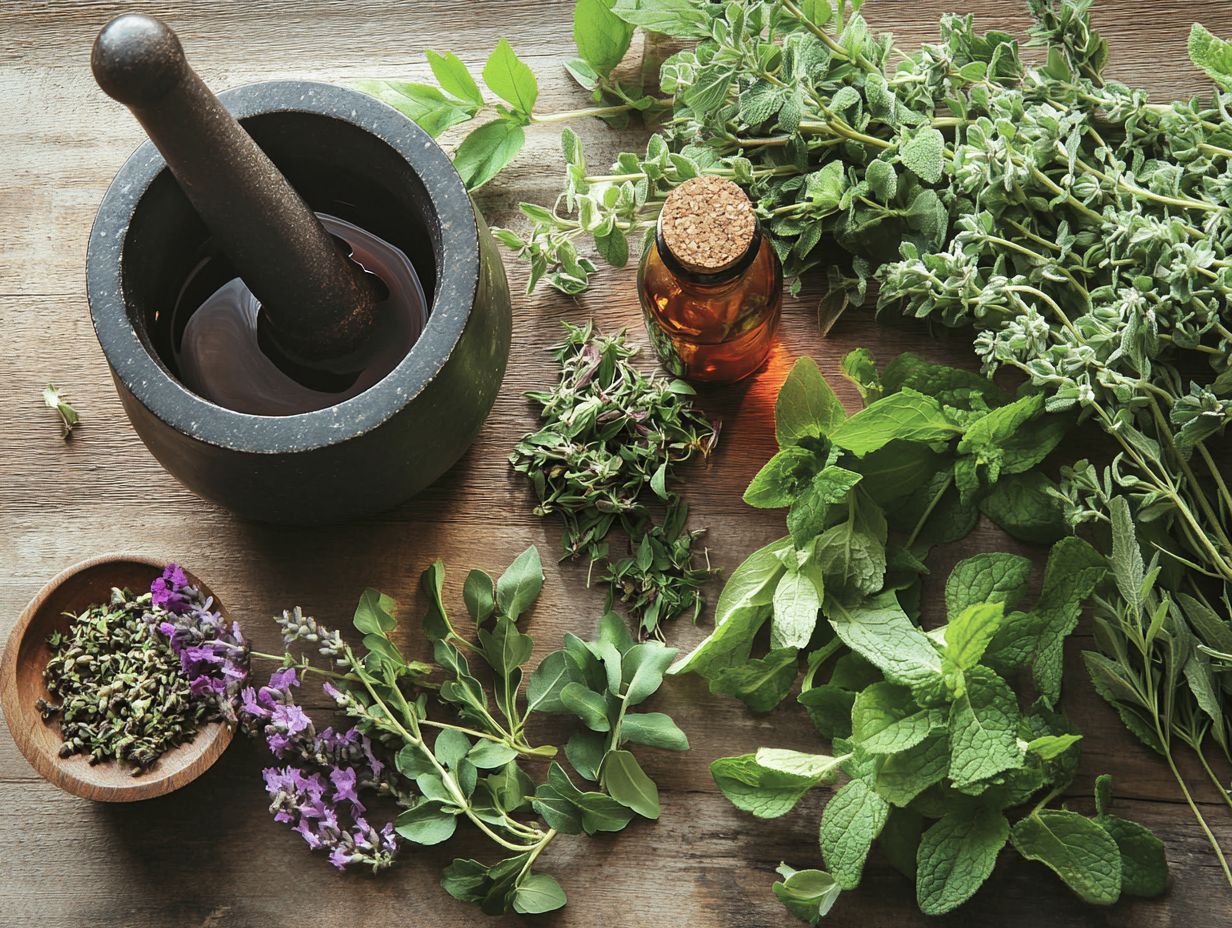
Utilizing herbal remedies brings a wealth of advantages, especially for managing diverse health conditions and elevating both physical and mental well-being.
Physical and Mental Health Benefits
Herbal remedies like ginseng, St. John’s Wort, and Echinacea are renowned for their unique benefits to both physical and mental health.
These time-honored botanicals aren’t mere myths; contemporary research validates their potency in enhancing overall well-being. For example, studies indicate that ginseng can significantly boost the immune response, making it a go-to during cold and flu seasons.
St. John’s Wort may help ease anxiety symptoms, with clinical trials suggesting it may rival some prescription antidepressants. Then there’s Echinacea, celebrated for its ability to prevent respiratory infections, with evidence supporting its role in reducing both the duration and severity of colds.
By incorporating these herbal remedies into your daily routine, you could not only strengthen your immune system but also cultivate a sense of calm and balance in today s fast-paced world. Start incorporating these powerful herbs into your daily routine today!
Common Herbal Remedies and Their Uses
Common herbal remedies include a diverse array of natural products, spanning from dietary supplements to herbal medicines. Each of these remedies offers distinctive applications for enhancing health and wellness.
Overview of Popular Herbs and Their Uses
Popular herbs like garlic, feverfew, and kava catch your attention for their remarkable health benefits and versatile uses in herbal remedies.
These herbs boast a rich history across various cultures, cherished not only for their culinary applications but also for their therapeutic properties. For instance, garlic has earned its stripes in traditional medicine for its immune-boosting abilities and cholesterol-lowering effects, with research backing its role as an antimicrobial agent.
Feverfew stands out for its effectiveness in alleviating migraines, and historical accounts reveal its use among ancient Greeks for treating fevers. Kava has garnered interest for its calming effects, particularly in managing anxiety, with ongoing research into its potential as a natural anxiolytic.
Each of these herbs presents a unique profile, enhancing not just your health but also your understanding of herbal tea and its role in holistic health.
Are Herbal Remedies Safe and Effective? Find Out!
The safety and effectiveness of herbal remedies are essential factors to consider when exploring alternative therapies. These options might offer benefits, but they also come with potential health risks and the possibility of interactions with other herbs or medications.
Always be smart and do your homework before trying them out!
Factors to Consider and Possible Risks
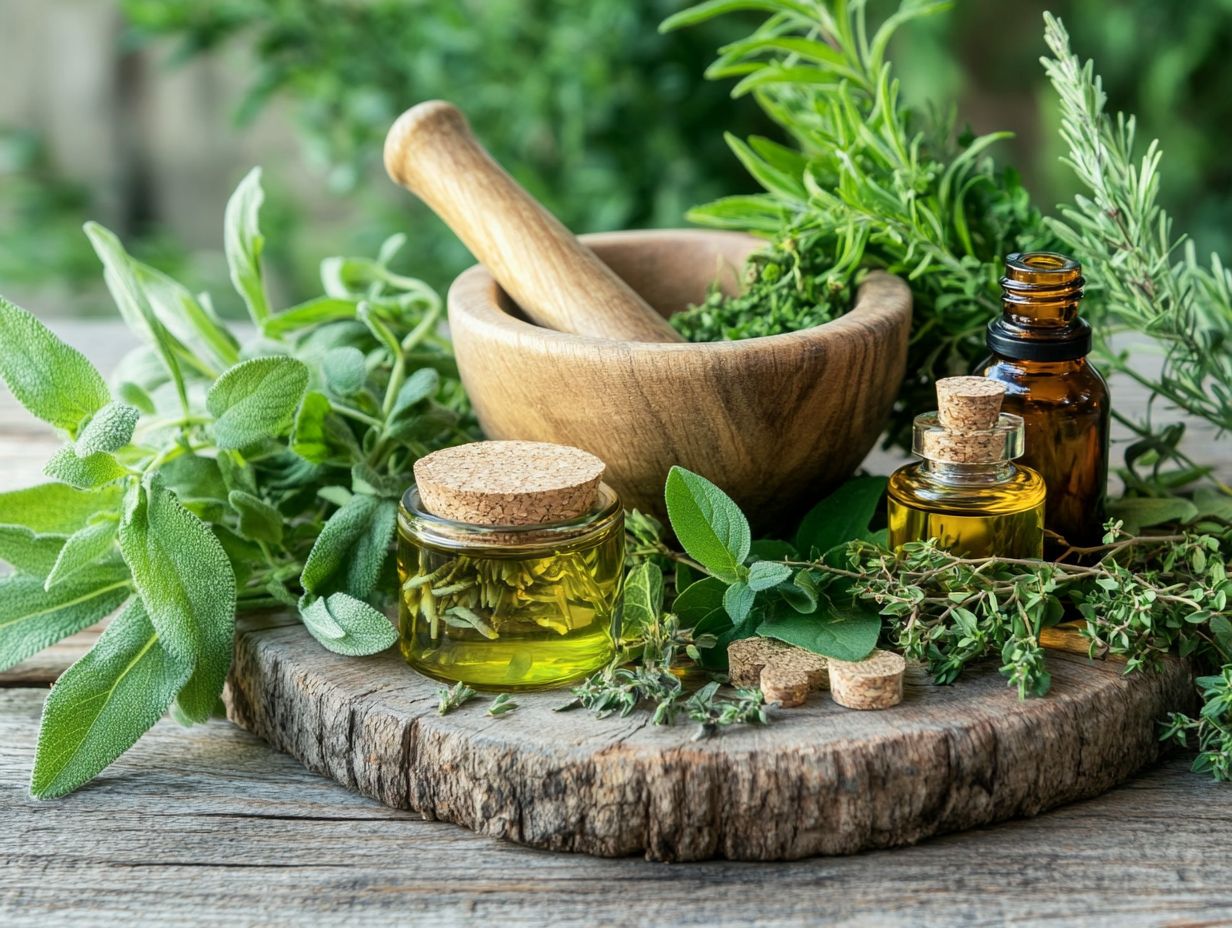
When using herbal remedies, you must consider various factors, including safety, potential health risks, and herbal interactions.
Evaluate the credibility of the source from which you obtain these remedies, ensuring that the herbs have been thoroughly tested for purity and potency. It’s equally vital to research the specific herb’s effects on health and documented uses. Additionally, learning how to use herbal remedies responsibly can enhance your understanding and safety when utilizing these natural options.
Another critical element involves understanding how these natural treatments might interact with your prescribed medications. Certain herbs can either amplify or inhibit the effects of conventional treatments, which could lead to undesirable health outcomes.
Talk to a healthcare professional to get valuable insights, ultimately contributing to a more well-considered choices process about incorporating herbal options into your health regimen.
Integrating Herbal Remedies into Holistic Health Practices
Integrating herbal remedies into your holistic health practices can substantially elevate your wellness strategies. These natural solutions serve as a perfect complement to conventional treatments, enriching your overall approach to well-being.
Tips for Incorporating Herbal Remedies into a Holistic Lifestyle
Incorporating herbal remedies into your holistic lifestyle begins with crafting a personalized wellness plan that nurtures your natural balance and well-being.
This plan should encompass specific goals tailored to your unique needs, taking into account factors like existing health conditions and your lifestyle choices, including dietary choices and natural products. Start by consulting health professionals, including holistic providers and integrative physicians who can guide you toward understanding what herbal remedies are and effective options.
Regularly integrating herbs such as chamomile for relaxation or ginger for digestive support can significantly elevate your daily routines. To understand more about how to effectively use these herbs, consider exploring the role of herbalists. Stay proactive! Regularly check your progress to enhance your self-care journey.
Monitoring your progress and making adjustments as necessary is crucial, enabling you to adopt a proactive approach that emphasizes self-care, natural balance, and wellness strategies, along with mindfulness and patient education on your journey toward enhanced health.
Frequently Asked Questions
Curious about herbal remedies? Let s dive into their role in holistic health!
Herbal remedies have been used for centuries as a natural way to promote overall health and well-being. In holistic health practices, such as acupuncture and traditional Chinese medicine, herbal remedies are often used as a complementary treatment, part of alternative therapies alongside other holistic therapies.
What types of herbal remedies are commonly used in holistic health?
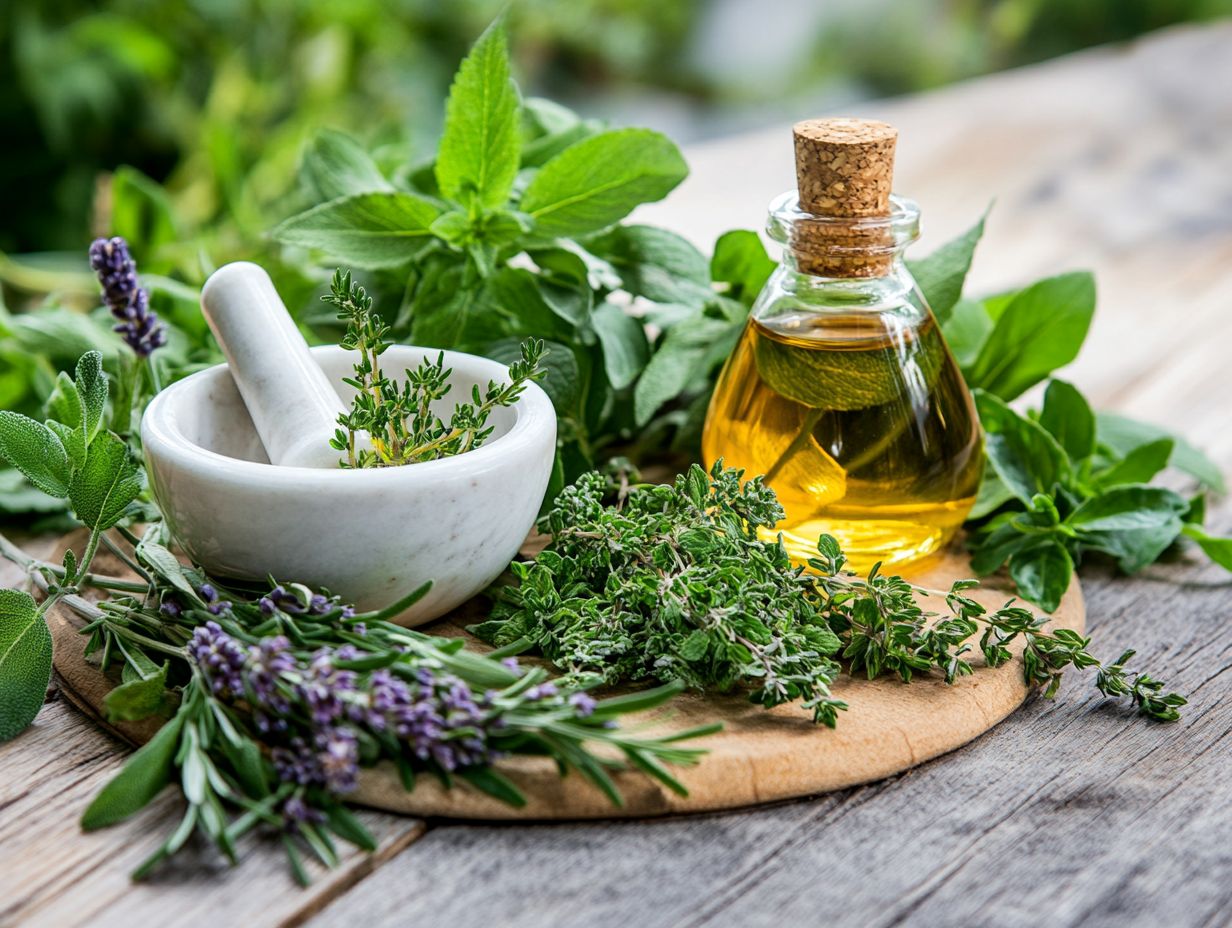
There are a wide variety of herbal remedies used in holistic health, such as feverfew and garlic, including teas, tinctures, capsules, and extracts made from plants and plant-based ingredients, such as roots, leaves, flowers, and berries.
How do herbal remedies promote holistic health?
Herbal remedies work to promote holistic health by supporting the body’s natural healing processes, backed by botanical products and pharmacological compounds. They can help to address imbalances in the body, boost the immune system, and provide essential nutrients, antioxidants, and herbal preparations.
Are there any risks associated with using herbal remedies in holistic health?
While herbal remedies are generally safe, it is important to consult with a qualified healthcare provider, including herbal medicine practitioners, before using them especially if you are pregnant, breastfeeding, or have a chronic health condition that may require specific patient care or are taking any medications.
Don t wait get the guidance you need today for a healthier tomorrow! Explore herbal remedies responsibly and consult professionals for personalized advice.
Can herbal remedies be used with traditional medicine?
Yes, herbal remedies can complement traditional medicine.
It’s crucial to tell your healthcare provider about all remedies and medications you take to avoid any potential interactions.
Discover some exciting herbal remedies used in holistic health!
Common options include echinacea for immune support, ginger for digestive health, and chamomile for relaxation and stress relief.
Remember, the right remedy depends on your unique health needs.

